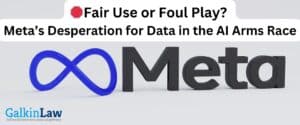
Library Genesis (LibGen), a well-known online repository of pirated books, academic papers, and other copyrighted materials, has become a flashpoint in the race to develop advanced AI systems. Recent lawsuit filings have revealed that Meta, in its efforts to train its Llama models, considered and potentially used LibGen as a data source.
Internal communications disclosed in court show that Meta executives recognized the legal and ethical risks of using such pirated content, even discussing measures to obscure metadata, copyright headers, and other identifiers to reduce liability.
The lawsuit, filed by authors including Richard Kadrey and Sarah Silverman, accuses Meta of using copyrighted material without permission in violation of intellectual property laws. Meta has defended its actions by invoking the legal doctrine of fair use, arguing that using copyrighted material for training AI models falls under this exception. However, fair use is context-dependent, requiring courts to consider factors such as the purpose of use, the nature of the copyrighted work, the amount of material used, and the impact on the market for the original work.
Under these circumstances, Meta’s fair use claims face significant hurdles. Training a commercial AI system using entire works, especially from a source like LibGen that hosts pirated content, likely involves copying substantial portions of copyrighted material in ways that could directly harm the market for those works. The secretive nature of the discussions, including efforts to hide the source of the data, further undermines the argument that this use was transformative—a key component of fair use.
The revelations about Meta’s practices reflect a broader issue in the AI industry. As developers confront the “data wall”—a scarcity of new, high-quality training data—some may resort to ethically and legally questionable methods to maintain a competitive edge. These practices not only expose companies to legal risks but also raise critical questions about the integrity of AI systems built on pirated or improperly sourced content. The ongoing legal challenges, including Meta’s fair use defense, could shape the boundaries of acceptable data use in AI development and the accountability of companies in their pursuit of innovation.
See more details on the case here.
#CopyrightInfringement #AIRegulation #FairUseDebate #DataEthics #AIInnovation
